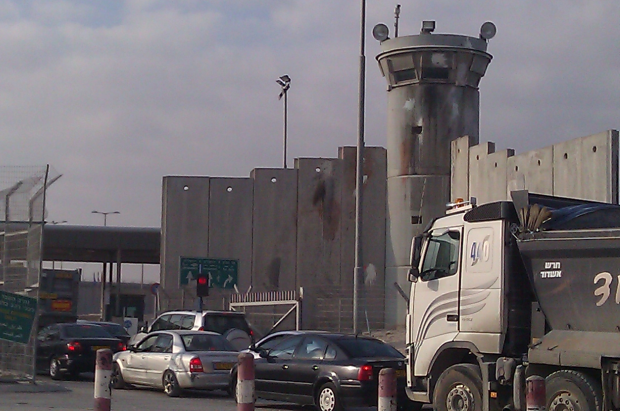Graduate Student Research: Foreign Aid and Palestinian Educational NGOs in the West Bank
By Melanie Meinzer (Ph.D. Student, Political Science)
This January, I spent two weeks in the West Bank conducting pre-dissertation field research on foreign aid and Palestinian education NGOs, supported by grants from UConn’s Human Rights Institute and the Political Science Department. The Palestinians are among the world’s highest per capita recipients of foreign aid, and the West Bank is a particularly interesting context in which to study foreign aid, given donor commitments to development and human rights, amidst the Israeli occupation and Palestinian statelessness.
A growing group of scholars contend that the influx of foreign aid to the West Bank since the signing of the Oslo Accords in 1993 has demobilized Palestinian civil society by diverting grassroots activism into development work. Comparing the first and second intifadas (uprisings), scholars see foreign aid as progressively weakening Palestinian civil society’s role in the resistance movement. My research asks how foreign aid has altered Palestinian education in the West Bank. Specifically, whether or not foreign aid restricts educational NGOs’ and teachers’ abilities to teach politically provocative subjects, like Palestinian history and Islam.
When we talk about liberal arts education at in the U.S. and here at UConn, we implicitly link education with individual emancipation through gaining knowledge and critical thinking skills. The emancipatory intent imbued in our understanding of education resonates with the global human rights agenda, embodied in the Right to Education in the Universal Declaration of Human Rights (1948).
The Israeli-Palestinian conflict has long polarized Middle Eastern politics, and education is no exception. Yet education with an emancipatory intent is even more imperative in situations of asymmetrical conflict. As a process of socialization and identity formation, education cannot be politically neutral. Palestinian education has historically been controlled by local and international forces, including foreign governments (the Ottomans, Jordanians, British, and Israelis), foreign donor agencies, domestic political factions (Fatah, Hamas), and grassroots activists who have frequently aligned with political parties. The Palestinian Ministry of Education and Higher Education was established in 1994, shortly after the Palestinian Authority was founded.
Having never traveled to the West Bank, my aim was to untangle one piece of the puzzle: whether aid-reliant Palestinian educational NGOs were more likely to adopt an apolitical approach to their work, compared with their non-aid-reliant counterparts. I spent two weeks interviewing PA officials, education experts, representatives of Palestinian educational NGOs, and teachers about how donor demands influence their work. Education matters because it is a central aspect of state building and identity formation. Education is the PA’s second-largest expenditure after security, and educational NGOs are the largest recipients of NGO aid.
Caption: I traveled back and forth between Ramallah and East Jerusalem to complete my interviews. This is a picture of the well-known Qalandiya checkpoint, which Israel requires Palestinians use when crossing the Separation Wall.
Caption: when crossing Qalandiya on foot, I stood in line to go through the metal detector and passport checkpoint. Everyone must pass single-file through these metal cage hallways, which are topped with barbed wire, ostensibly to prevent protests or disruptions.
Moreover, I came to study this topic because I am committed to the idea that education should empower people to think critically. We can only create a better world by critically evaluating the politics of our past and present social and economic relations. Despite the emancipatory goals of human rights education, I often heard the human rights discourse associated with the depoliticization that accompanied development, rather than with challenging the Israeli occupation in the name of Palestinian self-determination.
Caption: the author in Jifna, a small village outside Ramallah.
I also observed how economic disparities exacerbated the geographical and cultural fragmentation of the Palestinian community. While I was in the West Bank, the Staff Union of the United Nations Relief and Works Agency was on strike. By the time I arrived, health and social services, schools, and garbage collection in the refugee camps had been suspended for several weeks. The garbage piling up in the streets of the nearby Jelazun Refugee Camp attracted international media attention. One day as I was returning from Ramallah, my shared taxi was diverted by a crowd of young men from the Jelazun camp who were rolling tires into the street to set on fire and block the main roads to and from Ramallah. While I was unnerved by this experience, my Palestinian hosts explained that it was a common method for drawing the PA’s and UNRWA’s attention to the plight in the camp. Several other Palestinians told me that the lack of attention paid to these types of protests was symptomatic of the fragmentation of the community due to the Israeli occupation and expanding settlements.
Caption: I took this picture from my shared taxi. Young men from the nearby Jelazun refugee camp were blocking the road between Ramallah and Bir Zeit village. The blockade was removed by PA forces later that afternoon.
I am grateful to UConn’s Human Rights Institute for enabling me to conduct the pre-dissertation field work that I am using to craft my dissertation research project. In addition to gaining on-the-ground insight into my project, I was able to practice my Arabic and experience a bit of Palestinian culture and learn about Palestine through the eyes of people living in the West Bank.



